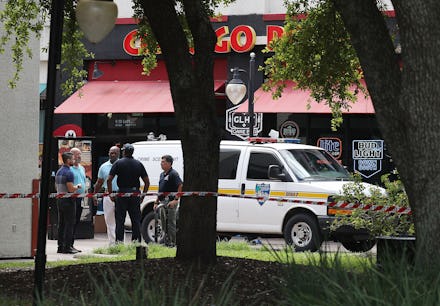Movement Must-Reads: A disastrous cash bail law in California, and Jacksonville survivors speak out

This week’s newsletter covers a lot of ground, from the Afropunk music festival, to the mass shooting in Jacksonville, Florida, to a voter registration drive masquerading as a gorgeous public art project and the Poor People’s Campaign’s efforts to raise the federal minimum wage.
Plus, be sure to check out our question of the week below. Read on for more.
From Mic:
Chauncey Alcorn on the myriad shortcomings of California’s widely celebrated law ending cash bail — the first law of its kind in the nation, but with some major caveats that might actually ending up hurting defendants.
Chauncey also has a harrowing interview with a pair of survivors of Sunday’s mass shooting at a video game tournament in Jacksonville, Florida, where security was unusually lax for such an event, the two men say.
Natelegé Whaley’s piece on a couple that got kicked out of the VIP section at the Afropunk music festival in Brooklyn, New York, because one of them had on a T-shirt criticizing the event.
Her piece on the Inside Out/Vote voter registration drive-meets-public art project, which kicked off on Wednesday in Pennsylvania, is also great.
And Aaron Morrison on the Poor People’s Campaign’s efforts to raise the federal minimum wage. Aaron’s Mic Dispatch segment on the topic can be viewed here.
From elsewhere:
A terrific profile of actor Riz Ahmed by the New York Times Magazine.
ESPN’s series on mental health in the NBA is well-executed and important. There are multiple entries, but the latest is this one.
And Teen Vogue on the fallout from Betsy DeVos’ disastrous tenure as secretary of education.
Last week:
We got some great responses to last week’s question, one of which I’m sharing below. To recap, that question was:
“Robert McCulloch’s tenure as St. Louis County’s prosecuting attorney has been marked by controversy — from his refusal to prosecute Officer Darren Wilson for killing Michael Brown in 2014, to his decision not to charge Officer Joshua Lasley for killing Tyler Gebhard. What, if anything, should McCulloch’s presumptive successor — Wesley Bell — do to restore trust in the prosecutor’s office among black communities in the St. Louis area?“
Karen wrote back:
“I think one thing that would restore trust is for shooting investigations not be done solely by the agency that committed them. Create something like a mini grand jury to investigate, include community members, and report to the community as a whole when the investigation’s done.”
A sound answer, and one that I know activists nationwide have floated. For an imperfect parallel, see also New York’s 2015 appointment of a special independent prosecutor — in this case, the state attorney general — to investigate local-level civilian deaths at the hands of police.
Thanks, Karen!
This week’s question:
California’s new law eliminating cash bail has been celebrated by some progressives. But reform advocates say it might be worse for defendants because it gives judges way more discretion over who to lock up before trial, and when — even without bail being on the table.
Was it worthwhile to end cash bail if it means judges now have the power to do almost exactly what cash bail did — except this time, without even giving them the option to pay their way out?
Send your answers to me via email, I’m at zak@mic.com.
That’s all for now. Until next week.
— Zak Cheney-Rice, Editor, The Movement